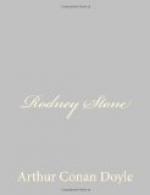“I tell you that you shall not say so.”
Sir Lothian’s fierce little grey eyes had to lower themselves before the imperious anger which shone in my uncle’s.
“Well, to let that point pass, it is monstrous to suppose that the title and the estates can remain hung up in this way for ever. I’m the heir, Tregellis, and I’m going to have my rights.”
“I am, as you are aware, Lord Avon’s dearest friend,” said my uncle, sternly. “His disappearance has not affected my love for him, and until his fate is finally ascertained, I shall exert myself to see that his rights also are respected.”
“His rights would be a long drop and a cracked spine,” Sir Lothian answered, and then, changing his manner suddenly, he laid his hand upon my uncle’s sleeve.
“Come, come, Tregellis, I was his friend as well as you,” said he. “But we cannot alter the facts, and it is rather late in the day for us to fall out over them. Your invitation holds good for Friday night?”
“Certainly.”
“I shall bring Crab Wilson with me, and finally arrange the conditions of our little wager.”
“Very good, Sir Lothian: I shall hope to see you.” They bowed, and my uncle stood a little time looking after him as he made his way amidst the crowd.
“A good sportsman, nephew,” said he. “A bold rider, the best pistol-shot in England, but . . . a dangerous man!”
CHAPTER X—THE MEN OF THE RING
It was at the end of my first week in London that my uncle gave a supper to the fancy, as was usual for gentlemen of that time if they wished to figure before the public as Corinthians and patrons of sport. He had invited not only the chief fighting-men of the day, but also those men of fashion who were most interested in the ring: Mr. Fletcher Reid, Lord Say and Sele, Sir Lothian Hume, Sir John Lade, Colonel Montgomery, Sir Thomas Apreece, the Hon. Berkeley Craven, and many more. The rumour that the Prince was to be present had already spread through the clubs, and invitations were eagerly sought after.
The Waggon and Horses was a well-known sporting house, with an old prize-fighter for landlord. And the arrangements were as primitive as the most Bohemian could wish. It was one of the many curious fashions which have now died out, that men who were blase from luxury and high living seemed to find a fresh piquancy in life by descending to the lowest resorts, so that the night-houses and gambling-dens in Covent Garden or the Haymarket often gathered illustrious company under their smoke-blackened ceilings. It was a change for them to turn their backs upon the cooking of Weltjie and of Ude, or the chambertin of old Q., and to dine upon a porter-house steak washed down by a pint of ale from a pewter pot.




